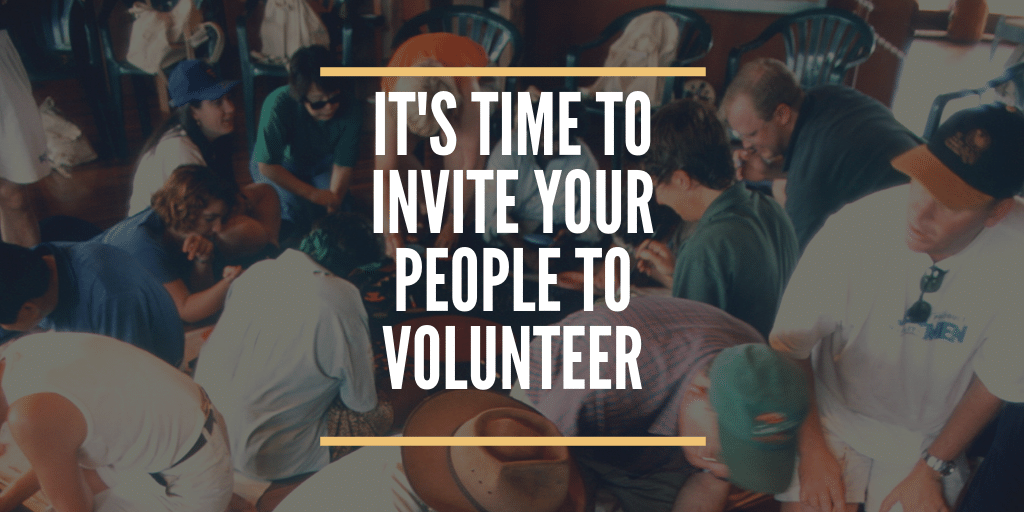We believe in involving everyone at your church in your capital campaign. While we’d love to take credit for the idea, we’re just doing what the research tells us. Engagement is consistently highly correlated with life satisfaction, evangelistic communities, and participation in financial giving. Our previous success and the latest research has proven that our process-oriented strategy works. When organizing a church capital campaign our method to provide volunteer opportunities for everyone to get involved in the church’s mission. Read on to see how we do it.
From my years in ministry work I remember that sometimes by choosing to involve volunteers I created more work for myself. Waiting to hear back for feedback before making a decision, constant communication and updates on progress, balancing multiple opinions and seeming to never be able to move forward as quickly as I would have liked, it was tempting to just throw my hands up and say, “I’ll just do it myself!”. But that would have been missing the point.
The Sabbath was made for man
This topic brings my mind to what Jesus says in Mark 2:27, “The Sabbath was made for man, not man for the Sabbath.” It is understandable to think about a capital campaign as a project that has to get done in the most efficient way possible. However, we must keep in mind that the capital campaign exists for the people; the people don’t exist for the campaign!
Your goal should be to implement a process and method that invites people to become the best version of themselves – the person that God is calling them to be. That person is probably gifted, connected, respected, valued, consulted and giving. The capital campaign process you employ should utilize strategies, activities, and an approach that supports this understanding of people-first. It is dignifying and respectful to create space for church members to be a part of the project.
The REAL reason you need volunteers
I’ll be the first to admit. A capital campaign is a TON of work. We estimate an average campaign takes about 700 hours of intentional leadership time, not including all the volunteer hours that go into it! (That’s why we advise churches not to take on a do-it-yourself campaign.) It is truly overwhelming and impossible for an already full-time staff or pastor to take it on alone. But surprisingly, the overwhelming amount of work is not the reason you need to recruit volunteers in your building campaign or fundraising project. When it comes to volunteers, it’s not about getting the work done, it’s about sharing the load.
The research findings are astounding. A campaign volunteer is 11x more likely than a non-volunteer to contribute to a campaign. The reason is simple: a shared sense of ownership. Denis Greene, Church Development president, explains more about the research below:
Denis outlined the volunteer teams we organize when getting started with a church capital campaign. Below is a list of highlights of the committees we organize and their roles in engaging the rest of the church community for you to think about when you are creating your capital campaign plan.
Prayer Committee
The Prayer Team’s task is to focus the campaign on prayer so that pledges to the campaign are made out of a Prayer and Discernment process. The Prayer Team plans activities to encourage members to pray throughout the campaign, both individually and corporately. Your team leader should be a person who can engage the entire church in prayer; who can think big and creatively; and is committed to prayer. This team:
- Meets 3-4 times and encourages the congregation to pray throughout the Capital Campaign both individually and corporately by providing a variety of resources.
- Examples of Prayer Team tasks:
- Create a Campaign Prayer Calendar (to encourage daily prayer during campaign)
- Plan a 12 or 24 hour prayer vigil or have a special prayer service
- Create a Prayer Guide that includes prayers, scriptures and reflections to help facilitate the Prayer and Discernment process
- Plan and lead a Prayer Walk
- Coordinate with Events Team an appropriate prayer time at the campaign events
- Coordinate with Pastor a prayer time in worship
Events Committee
The Events Team has a very important role. Evidence shows that the success of a capital campaign is directly correlated to the number of members who attend events prior to Commitment Sunday. At the events, members will have an opportunity to dialogue with the pastor and church leaders about the campaign and project. This is a time to ask questions, get answers and voice concerns. Your co-chairs for this team need to be detail-oriented persons who will delegate tasks to their team. These leaders need to be skilled at multi tasking, good with organization and able to effectively meet deadlines. The Events Team:
- Meets 3-4 times to plan, organize and oversee a series of church-wide informational events.
- Goal: every church family attend one event.
- Examples of Events Team tasks:
- Schedule the events to work with the pastor and co-chairs’ schedules
- Develop a plan to maximize event attendance e.g., small group or large group events
- Follow up on invitations when necessary with phone calls to maximize attendance
- Keep track of event attendance
- Plan and coordinate the meal or dessert at each event
- Possibly plan a celebration following Commitment Sunday
- Plan locations of events
- Plan food / refreshments
- Assign team members for room set up, and clean up
- Record all Q&As at each event
Thanks Committee
This team devises a process to thank those who make a pledge or gift to the campaign. It is suggested that each donor receive a personalized thank you letter from the pastor and a handwritten thank you card from the Thanks Team. The Thanks Team may also decide to provide a small, inexpensive gift to recognize each person/household who participates in the campaign. The Thanks Team is also responsible for making sure donors are thanked upon completion of their pledge fulfillment.
For this committee you need open minded leaders who can see the potential value of giving a gift of gratitude to each campaign donor. The outer two-thirds of the church (modestly involved who seldom attend) often become more involved in the church through their interest in the thank you gift. This team also writes personal thank you notes to donors.
- Meets 2 times to decide ways to express gratitude to those involved in the Capital Campaign.
- Examples of Thanks Team tasks:
- Send personal thank you notes to campaign volunteers and donors
- Give an inexpensive memento as a thank you gift to donors
Youth Committee
This team is made up of adults and youth. The youth’s participation in the capital campaign is evidence of the church’s commitment to them. This team assists the church and the other campaign teams with the inclusion of children and youth in the process of the capital campaign. The leaders of this team relate well to youth and children, and can be creative in imagining how to get youth and children involved.
- Meets 3 times to plan opportunities for children and youth to learn about stewardship.
- Below are examples of Y/C Team Tasks:
- Coordinate the children/youth program to assist the Thanks Team in writing thank you notes
- Ask youth to write a paragraph on what the church means them or share in a video testimonial. (We have a training video to show how to do a video testimony in our stewardship video library)
- Coordinate an event with the Events Team that is just for teens to discuss with the pastor how the campaign plans affect the youth
- Develop a guide for parents to engage teens/children in a discussion about stewardship and potentially contributing to the campaign from their allowance or employment earnings (the point for this activity is not so much about the money as it is an experiential education for adolescents)
Ambassadors Committee
The Ambassadors Team provides important reminders during the campaign. The leaders recruit and oversee a team that makes phone call reminders during the campaign before and after Commitment Sunday.
- Meets 2 times to plan and 1 time to train volunteer team
- Examples of Ambassador Tasks:
- Recruit ambassador volunteers to personally reach out about the campaign
- Train volunteers to answer questions about the capital campaign when they make reminder phone calls after commitment packets are distributed.
- Contact each church household prior to Commitment Sunday to ensure they received all campaign materials. Ambassadors will also answer questions about the campaign as well as make sure members are aware of the importance of Commitment Sunday
- Contacts are also made following Commitment Sunday to remind families that there is still an opportunity to support the campaign if they would like to make a gift or pledge.
Communication Committee
The Communications Team has a big task. They develop a strategy and plan to educate members about the need of the church and communicate about the capital campaign. This team produces newsletter articles, social media posts, brochure text and photos, signage, posters, banners, etc, to generate excitement among members. You need leaders who are skilled at copy-writing and editing as well as good in creative communications, brand development, graphic design, social media, and print-ready publication creation. If you hire a professional firm to manage and consult on your capital campaign they should provide a professional graphic designer to assist.
- Meets 3-4 times to gives input on the communication pieces.
- Examples of Communication Tasks:
- Assist in communicating important campaign information
- Consider a variety of ways to communicate the campaign message, e.g., posters, website, e-blasts, newsletters, bulletin inserts, campaign packet, etc.
- Selection of a campaign title, campaign theme, campaign slogan and logo
- Makes available such items as member quotes, church history and pictures for all the communication pieces of the campaign
- Creates posters, banners, and a pledge tracking instrument to promote the campaign
- Helps review all communication materials before they are finalized
Steering Committee
This team is made of all working volunteer committee leaders, the Management Team members (see below) plus additional lay leaders. This group might grow out of the leadership body that conducted your capital campaign feasibility study. The purpose of this team is to be the main decision-making body of the campaign e.g., set the financial goal, give feedback on the campaign prayer, etc.
A Note on Leadership – Management Team
While volunteers are crucially important, there does need to be a small body of dedicated leaders who are putting in those 700 hours of coordinating and moving the campaign forward. This is not quite a volunteer committee but it’s important to mention. We call that group the management team. Made up of the senior pastor, church administrator, campaign chair, and your church capital campaign consultant, the purpose of this team is to help tailor the campaign for the specific needs of the church with professional guidance and management.
More information on these volunteer teams, the structure of a successful capital campaign, and how to run a process-orientated campaign based on stewardship, prayer, and discernment can be found in our comprehensive ebook on stewardship-based church capital campaigns. We’ve been doing this for a long time and are happy to share with you the lessons we’ve learned along the way.


